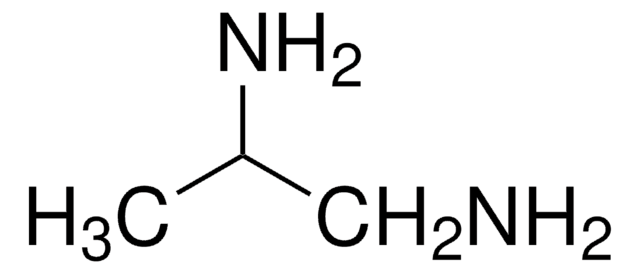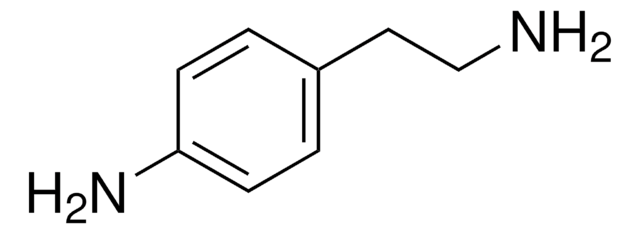D23807
1,3-Diaminopropane dihydrochloride
98%
Synonym(s):
1,3-Propanediamine, 1,3-Propanediamine dihydrochloride
About This Item
Recommended Products
Assay
98%
form
powder
mp
246-250 °C (lit.)
SMILES string
Cl[H].Cl[H].NCCCN
InChI
1S/C3H10N2.2ClH/c4-2-1-3-5;;/h1-5H2;2*1H
InChI key
HYOCSVGEQMCOGE-UHFFFAOYSA-N
Looking for similar products? Visit Product Comparison Guide
Application
- Tetradentate bis-phosphine ligands (P(2)N(2) and P(2)S(2)) and their Rh(III), Ni(II) and (105)Rh complexes: X-ray crystal structures of trans-[RhCl(2)(L2)]PF(6), [Ni(L2)](PF(6))(2) and μ-O(2)SO(2)-[Ni(L5)](2)(PF(6))(2).: This study explores the synthesis and characterization of tetradentate bis-phosphine ligands and their complexes, demonstrating significant advancements in ligand design and potential applications in catalysis and medicinal chemistry (Cagnolini et al., 2011).
Signal Word
Danger
Hazard Statements
Precautionary Statements
Hazard Classifications
Acute Tox. 3 Dermal - Acute Tox. 3 Inhalation - Acute Tox. 3 Oral - Eye Irrit. 2 - Skin Irrit. 2 - STOT SE 3
Target Organs
Respiratory system
Storage Class Code
6.1C - Combustible acute toxic Cat.3 / toxic compounds or compounds which causing chronic effects
WGK
WGK 3
Flash Point(F)
Not applicable
Flash Point(C)
Not applicable
Choose from one of the most recent versions:
Certificates of Analysis (COA)
Don't see the Right Version?
If you require a particular version, you can look up a specific certificate by the Lot or Batch number.
Already Own This Product?
Find documentation for the products that you have recently purchased in the Document Library.
Customers Also Viewed
Our team of scientists has experience in all areas of research including Life Science, Material Science, Chemical Synthesis, Chromatography, Analytical and many others.
Contact Technical Service












